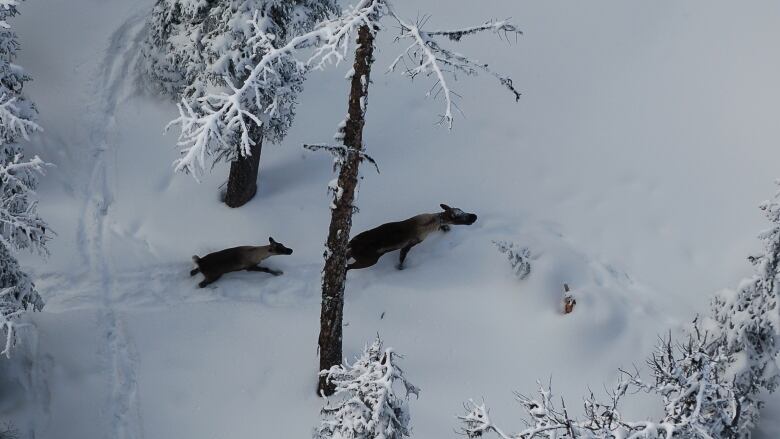Biologists make surprise discovery of southern mountain caribou calf
All the caribou in the Kootenays were thought to have been accounted for

Biologists made a surprising discoverylast week when they found a female caribou calf wanderingin the Purcell Mountainsnear Kimberley, B.C.
They thoughtall of thesouthern mountain caribou were accounted for when they began an operation in Januaryto gather the remaining caribou in the Kootenays and relocate them to a pen north of Revelstoke,in a desperate attempt to keep the species alive.
Allof the caribou were thought to have been captured, except for twostubborn bulls, one of which was found wandering with the calf.
"Originally, observers thought [the calf]was a yearling male, but we weren't that confident in the diagnosis," said Leo DeGroot, a wildlife biologist with the B.C. government. "So, our staff flew again ... and discovered it was actually a female calf."
DeGroottold reporter Bob Keating that the discovery of a female calfis especially important becauseshe can help with reproduction.
"[Southern mountain caribou's] days are limited," he said. "[The calf]will bevaluable to another larger population."
Relocation
He says they hope to capture the calf as early as this week using a helicopter and a net, to try and relocate her to the "maternity" pen nearRevelstokewiththe other caribouthat were previously moved.
Eventually, biologists hope to introduce the calf to the Columbia herd, which is about 150 strong.
They will try to capture the bull the calf was seen with, but the second bull they probably will leave to live out his life in the Purcells, said Degroot.
"Males aren't biologically important to move.In the population, they'll be moved to ... there's probably 50 or 60 males."
with files from Bob Keating and Daybreak South












_(720p).jpg)


 OFFICIAL HD MUSIC VIDEO.jpg)
.jpg)



























































































